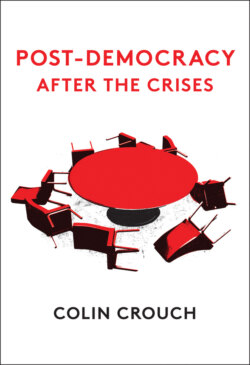Post-Democracy After the Crises

Реклама. ООО «ЛитРес», ИНН: 7719571260.
Оглавление
Colin Crouch. Post-Democracy After the Crises
Contents
Guide
Pages
Dedication
Post-Democracy After the Crises
Copyright page
Acknowledgements
Abbreviations
Preface
Post scriptum
1 What Is Post-Democracy?
Democratic Moments
The Weakening of Democracy
Liberal Democracy and Other Forms
2 Inequality and Corruption
Inequality and Democracy
From lobbying to clandestine opinion manipulation
Redefining Corruption
Imperfect competition and corporate neoliberalism
New public management
The outsourcing of public services
Conclusion
3 The 2008 Financial Crisis
How Financial Markets Were Deregulated
What Does 2008 Tell Us About Post-Democracy?
Would stronger democracy have performed better?
Conclusion
4 The European Debt Crisis
The Handling of the Eurozone Crisis and Post-Democracy
European Post-Democracy
5 Politicized Pessimistic Nostalgia: A Cure Worse than the Disease
Understanding Pessimistic Nostalgia
The US
Central and Eastern Europe
Western Europe
The UK and Brexit
Conclusion: The Non-Democratic Supports of Democracy
6 The Fate of Twentieth-Century Political Identities
The Decline of Class and Religion
Cultural and Economic Politics
7 Beyond Post-Democracy?
The Dependence of Democracy on Non-Democratic Institutions
Reviving Democratic Alternatives
Changing Formal Politics
The revival of environmentalism
The potentiality of gender politics
References
Index
POLITY END USER LICENSE AGREEMENT
Отрывок из книги
To the memory of Alessandro Pizzorno (01/01/1924–04/04/2019), who, in 1973, enabled me to embark on a career of research on comparative European industrial relations; who, in 1995, welcomed me to Florence and the European University Institute; who, in 2002, interested Giuseppe Laterza in my Fabian Society pamphlet, Coping with Post-Democracy, which led to my writing, in 2003, Post-Democracy.
From the initial writing of Post-Democracy in 2003 to this current volume, I have enjoyed invaluable encouragement and support from Giuseppe Laterza.
.....
With the exception of Slovenia, the populations of central and eastern Europe did not respond with exceptional enthusiasm to being able to vote in free elections after the fall of communism, turnout in their first elections during the 1990s being typically lower than those found even now in most of western Europe. Since then, there have been varying patterns (Figure 1.3), but decline has predominated.
The mass memberships of parties themselves also often declined, leaving their smaller number of activists representing the traditional symbolic identities of the classes and faiths that had built the party but not extending into new parts of the population. Party leaderships observed this, which meant that the mass parties were declining in their value to leaders as ways of connecting them to voters at large. As core constituencies shrank, party leaders came increasingly to believe that they did not really need core constituencies. Rather, they wanted to be able to take them for granted as voters who had no other home to which they could go, leaving leaders free to find votes across as wide a range of opinion as possible. This necessarily meant a decline in the clarity of parties’ profiles, weakening further any strong bonds they might have with citizens.
.....